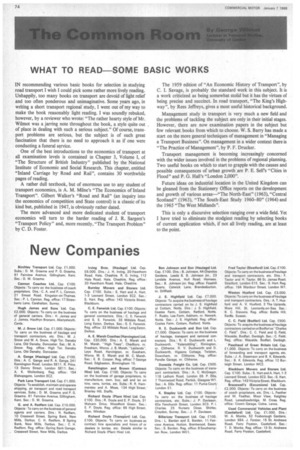WHAT TO READ-SOME BASIC WORKS
Page 76

If you've noticed an error in this article please click here to report it so we can fix it.
IN recommending various basic books for selection in studying road transport I wish I could pick some rather more lively reading. Unhappily, too many books on transport are devoid of light relief and too often ponderous and unimaginative. Some years ago, in writing a short transport regional study, I went out of my way to make the book reasonably light reading. I Was soundly rebuked, however, by a reviewer who wrote: "The rather hearty style of Mr. Wilmot was a jarring note throughout the book, a style quite out of place in dealing with such a serious subject." Of course, transport problems are serious, but the subject is of such great fascination that there is no need to approach it as if one were conducting a funeral service.
One of the best introductions to the economics of transport at all examination levels is contained in Chapter 3, Volume I, of "The Structure of British Industry" published by the National Institute of Economic and Social Research. This chapter, entitled "Inland Carriage by Road and Rail", contains 30 worthwhile pages of reading.
A rather dull textbook, but of enormous nse to any student of transport economics, is A. M. Milne's "The Economics of Inland Transport". Gilbert Walker's "Road and Rail" (an inquiry into the economics of competition and State control) is a classic of its kind but, published in 1947, is obviously rather dated.
The more advanced and more dedicated student of transport economics will turn to the harder reading of J. R. Sargent's "Transport Policy" and, more recently, "The Transport Problem" by C. D. Foster. The 1959 edition of "An Economic History of Transport", by C. I. Savage, is probably the standard work in this subject. It is a work criticized as being somewhat stolid but it has the virtues of being precise and succinct. In road transport, "The King's Highway", by Rees Jeffreys, gives a most useful historical background.
Management study in transport is very much a new field and the problems of tackling the subject are only in their initial stages. However, there are now examination papers in the subject but few relevant books from which to choose. W. S. Barry has made a start on the more general techniques of management in "Managing a Transport Business". On management in a wider context there is "The Practice of Management", by P. F. Drucker.
Transport management is becoming increasingly concerned with the wider issues involved in the problems of regional planning. Two useful books on which to start to grapple with the causes and possible consequences of urban growth are P. E. Self's "Cities in Flood" and P. G. Hall's "London 2,000".
Future ideas on industrial location in the United Kingdom can be gleaned from the Stationery Office reports on the development and growth of various areas—"The North-East" (1963), "Central Scotland" (1963), "The South-East Study 1960-80" (1964) and the 1965 "The West Midlands".
This is only a discursive selection ranging over a wide field. Yet I have tried to eliminate the stodgiest reading by selecting books of current application which, if not all lively reading, are at least to the point.




















































































































